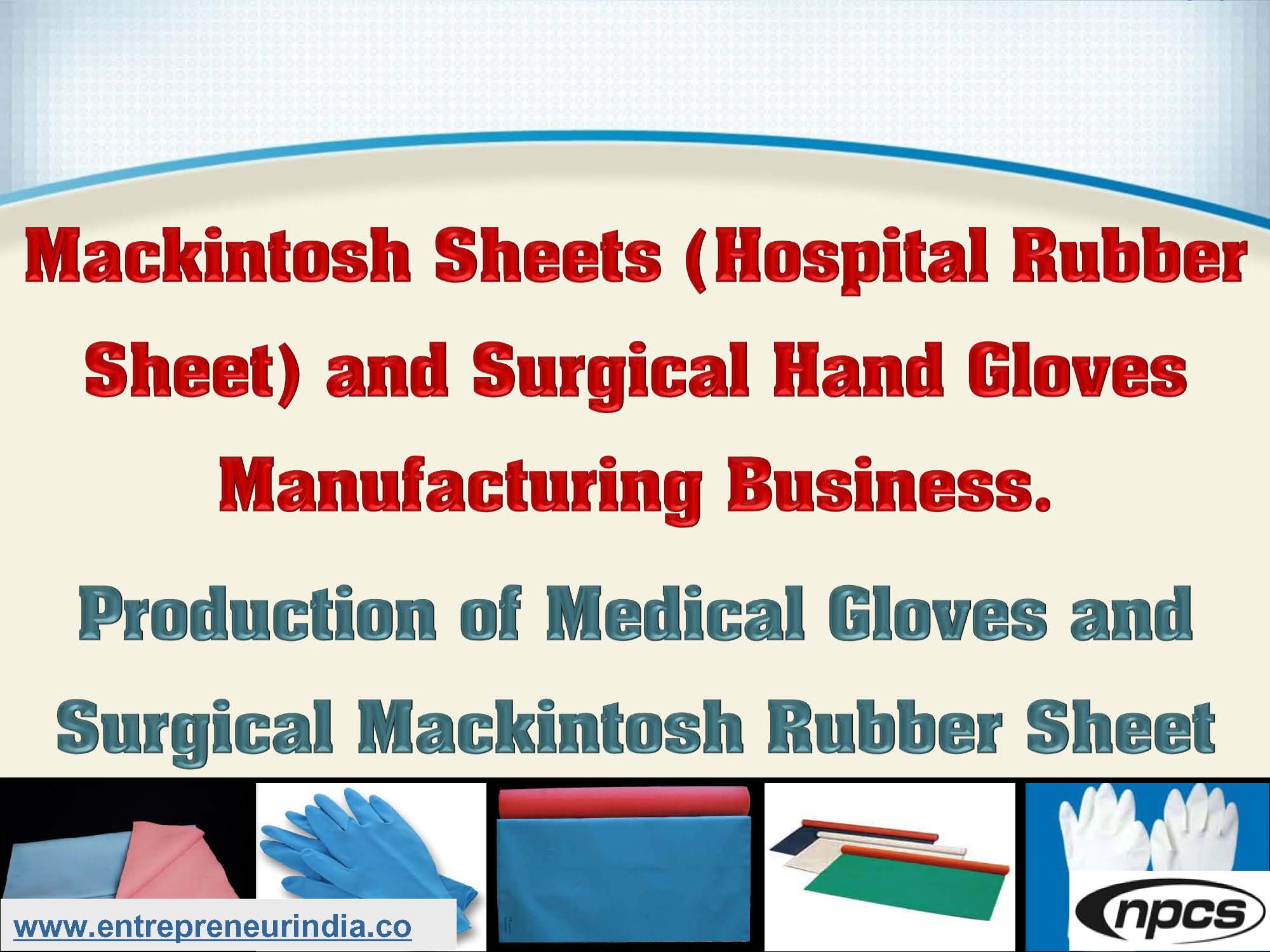
The Surgical Hand Gloves Manufacturing Business has emerged as one of the most essential and profitable sectors in the healthcare and hygiene industry. With rising awareness about infection control, hospital safety standards, and global health crises like COVID-19, the demand for high-quality surgical gloves has skyrocketed. This business not only serves hospitals and clinics but also caters to laboratories, pharmaceutical industries, salons, and food processing units.
If you’re looking for a sustainable and scalable manufacturing opportunity, the surgical hand gloves manufacturing business offers a robust and future-proof model.
Market Potential of Surgical Hand Gloves
The global market for surgical and examination gloves was valued in billions even before the pandemic, and it is projected to continue growing steadily. Key growth drivers include:
-
Increased global health spending
-
Government mandates on hygiene compliance
-
Rise in surgeries and medical diagnostics
-
Growing awareness of personal protection in non-medical sectors
This makes the surgical hand gloves manufacturing business a long-term investment with high return potential.
Types of Surgical Hand Gloves
In this business, manufacturers typically produce two main types of gloves:
-
Sterile Surgical Gloves
-
Used in operating rooms and sensitive medical procedures
-
Individually packed and sterilized
-
Requires higher manufacturing precision
-
-
Non-Sterile Examination Gloves
-
Used for general patient examination and diagnostics
-
Available in bulk packs
-
Also used in labs, food handling, and beauty industry
-
Material-wise, gloves are usually made from:
-
Latex Rubber (natural, highly elastic, but allergenic)
-
Nitrile Rubber (synthetic, latex-free, chemical-resistant)
-
Vinyl (economical, used for non-critical tasks)
Manufacturing Process of Surgical Hand Gloves
The production of surgical gloves involves precision engineering, quality control, and proper sterilization. Here’s a step-by-step overview:
-
Raw Material Preparation
-
Latex, nitrile, or vinyl compounds are prepared with additives for flexibility, durability, and safety.
-
-
Hand Mold Dipping
-
Ceramic or metal hand molds are dipped in the latex/nitrile solution.
-
Coagulant is applied beforehand to ensure uniform coating.
-
-
Pre-Vulcanization and Curing
-
The coated molds are heated to form elastic, durable gloves.
-
Gloves are then washed to remove proteins and chemicals.
-
-
Beading and Stripping
-
Beading is done at the cuff for easy donning.
-
Gloves are stripped from the molds using air-blast or mechanical means.
-
-
Sterilization
-
For surgical gloves, sterilization is done using gamma rays or ethylene oxide.
-
Examination gloves may be powder-free or lightly powdered.
-
-
Quality Testing
-
Pinhole leak tests, tensile strength, elongation, and powder residue tests ensure compliance with international standards.
-
-
Packaging and Labeling
-
Gloves are packaged in pairs or bulk, with clear expiry and sterilization details.
-
Machinery Required for Glove Manufacturing
Setting up a surgical glove plant requires specific machinery, including:
-
Latex/Nitrile compounding tanks
-
Glove dipping line (automated or semi-automated)
-
Vulcanization and curing ovens
-
Leaching tanks and washing systems
-
Beading and stripping units
-
Sterilization chamber (gamma ray or ETO)
-
Air compressors and chillers
-
Packing and sealing machines
Initial investment may vary from ?1 crore to ?5 crore depending on automation, capacity, and land cost.
Raw Materials Required
Essential raw materials include:
-
Natural or synthetic rubber (latex, nitrile, vinyl)
-
Sulphur and accelerators for vulcanization
-
Stabilizers and anti-oxidants
-
Zinc oxide and fillers
-
Coagulants like calcium nitrate
-
Sterilizing agents (for surgical gloves)
-
Packing material (poly wrappers, cardboard boxes)
All raw materials must comply with ISO and FDA standards to ensure safe, medical-grade output.
Space & Infrastructure Requirements
To start a surgical hand gloves manufacturing business, you need:
-
Land: 5,000–10,000 sq. ft. (depending on capacity)
-
Power supply: Minimum 100 kW with generator backup
-
Water supply and ETP plant (for effluent treatment)
-
Storage space for raw materials and finished goods
-
Cleanroom area for sterile packaging
A medium-scale setup with semi-automatic lines can produce up to 10,000–30,000 gloves per day.
Licensing and Compliance
Before starting operations, you must obtain:
-
Factory License
-
Pollution Control Clearance
-
Drug License (from CDSCO)
-
ISO 13485 Certification (for medical devices)
-
CE Marking or FDA approval (for exports)
-
GST Registration
-
Udyam Registration (MSME)
Proper documentation and adherence to hygiene standards are crucial for domestic and export markets.
Target Market and Customers
The surgical hand gloves manufacturing business serves a wide array of sectors:
-
Hospitals, clinics, diagnostic labs
-
Food processing units
-
Pharmaceuticals and chemical industries
-
Salons, spas, and tattoo parlors
-
E-commerce platforms (bulk and retail)
-
Government health procurement agencies
-
Exporters and distributors
B2B contracts with hospitals and health departments can generate high-volume recurring orders.
Marketing and Sales Strategy
A strong distribution and sales strategy is essential for success:
-
Partner with medical distributors and wholesalers
-
Attend healthcare expos and B2B trade shows
-
Build a B2B website and LinkedIn presence
-
List products on B2B marketplaces like IndiaMART, TradeIndia, and Alibaba
-
Apply for government tenders and supply schemes
-
Ensure product certifications are displayed for trust-building
Offering private label and custom packaging for bulk clients can also boost revenue.
Profitability and ROI
Here’s a basic profitability outline:
-
Production Cost per glove: ?1.5–?2.5 (depending on material)
-
Selling Price per glove: ?3–?6 (domestic); ?6–?10 (exports)
-
Profit Margin: 40%–60% gross; 15%–25% net
-
Breakeven: 18–24 months (medium-scale setup)
As demand is stable and often surges in pandemics or seasonal health cycles, the business can deliver long-term returns.
Conclusion
The Surgical Hand Gloves Manufacturing Business offers a golden opportunity for entrepreneurs aiming to enter the medical manufacturing industry. With consistent demand, government support, and international potential, this business promises high returns and meaningful impact. Whether you plan to start small or scale into exports, surgical gloves manufacturing is a recession-proof and essential industry worth investing in.
Niir Project Consultancy Services
An ISO 9001:2015 Company
106-E, Kamla Nagar, Opp. Spark Mall,
New Delhi-110007, India.
Email: npcs.ei@gmail.com , info@entrepreneurindia.co
Tel: +91-11-23843955, 23845654, 23845886, 8800733955
Mobile: +91-9811043595
Website: www.entrepreneurindia.co , www.niir.org





